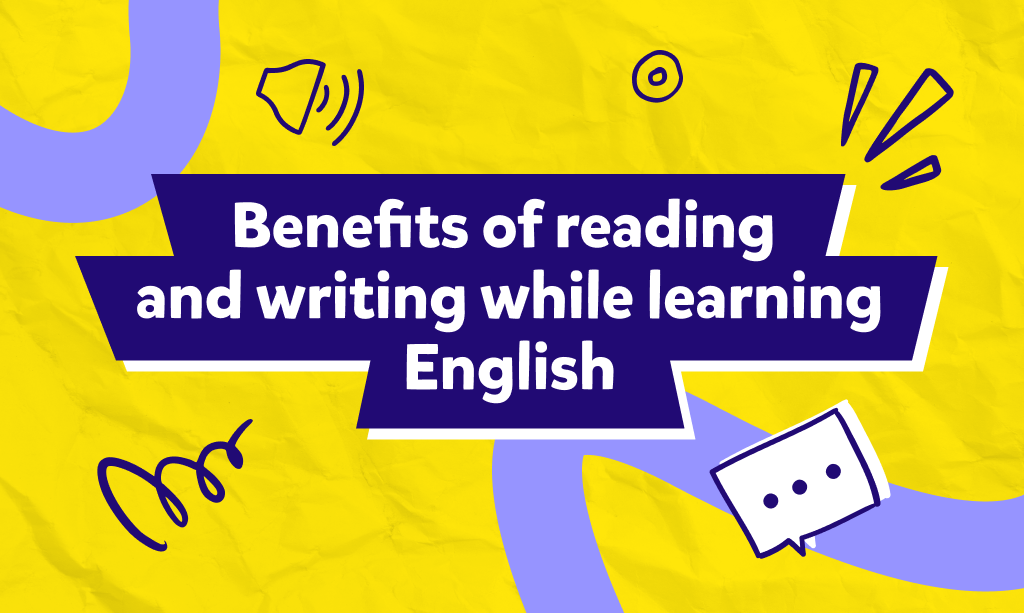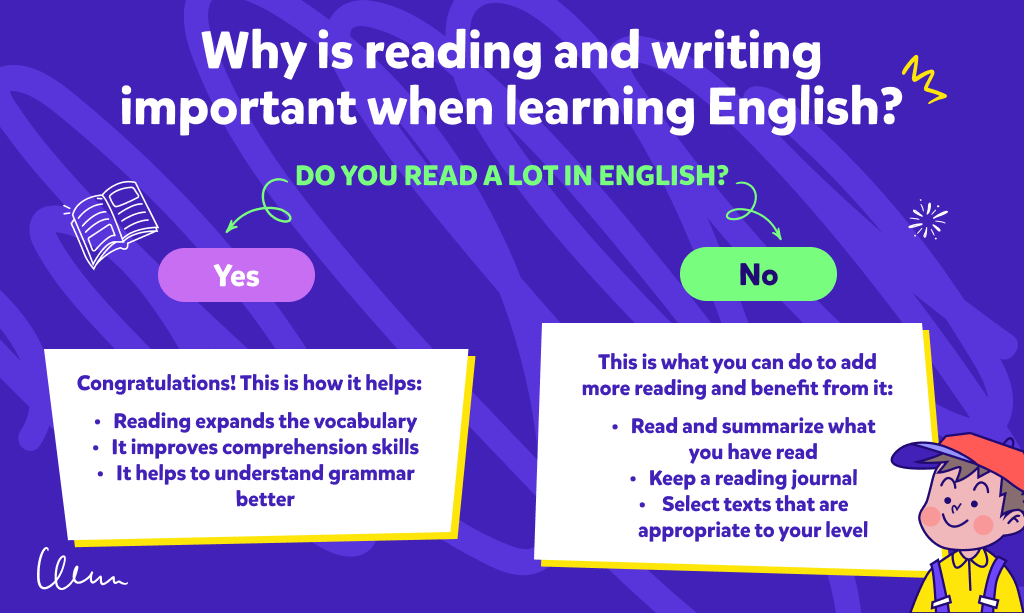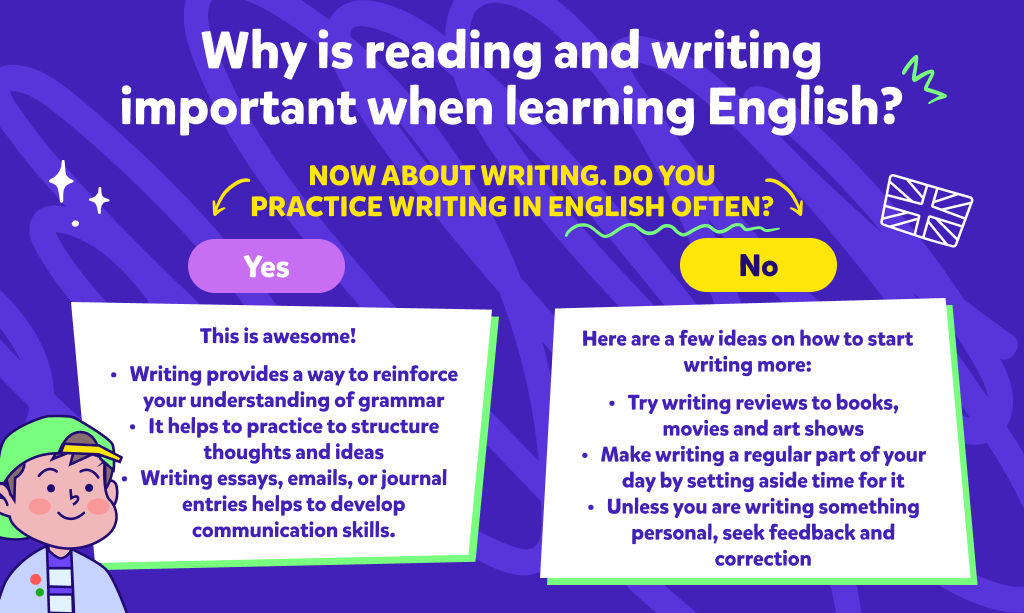- Reading and Writing in English
- Benefits of Reading in Learning English
- Benefits of Writing in Learning English
- How to Implement Reading and Writing
- Strategies for Maximizing the Benefits
Unlock the power of language with the benefits of reading and writing when learning English. Discover how these fundamental skills enhance comprehension, vocabulary, and fluency, leading to academic success.
Have you ever wondered why reading and writing are drilled and pushed upon you repeatedly when learning English? These skills not only enhance your proficiency but also open doors to a world of opportunities. In this article, we’ll explain why practicing reading and writing is so important when learning English, uncovering their benefits, and why they’re more than just academic exercises.
Reading and Writing in English
Imagine reading a story in English, focusing on understanding the plot, characters, and settings. Through this, you not only expand your vocabulary but also grasp grammar structures in context. Similarly, writing allows you to express your thoughts, ideas, and experiences in English, honing your communication skills. Together, reading and writing help reinforce comprehension fluency and add creativity to your language journey.
Beyond the classroom, the benefits of reading and writing extend much further. From improving critical thinking to having cultural understanding, these skills connect perspectives and knowledge when learning a new language like English. Whether you’re writing in a journal or reading Shakespearean sonnets, the rewards of reading and writing when learning English are boundless. Let’s uncover the magic that lies within the pages and pens of English, our guide to the benefits of reading and writing when learning English.
Benefits of Reading in Learning English
Let’s begin our guide by discussing the topic of reading. Reading plays a big role in learning English, offering benefits that go beyond just enjoying a good story. They can include things such as:
Vocabulary Expansion: When you read in English, you encounter new words in context, which helps you understand their meanings better. Each book introduces you to a range of vocabulary, expanding your overall language. The more you read, the more words you learn, enhancing your ability to express yourself confidently.
Improved Comprehension Skills: Reading helps sharpen your comprehension skills by exposing you to different writing styles, genres, and perspectives. As you read, you learn to infer meanings, identify main ideas, and draw conclusions, all of which are essential for understanding English. Over time, your ability to grasp ideas and follow narratives improves, making you a more proficient reader.
Exposure to Grammar and Syntax: Through reading, you subconsciously absorb the rules of grammar and syntax. You become familiar with sentence structures, verb tenses, and punctuation without even realizing it. Exposure to well-written texts also helps you internalize grammatical patterns and use them correctly in your own writing.
Enhanced Cultural Understanding: Reading exposes you to cultures, traditions, and perspectives, providing insights into the world. Whether it’s classic literature, contemporary fiction, or non-fiction works, it all teaches you about different societies, historical periods, and human experiences. This broadens your worldview and deepens your understanding of English language and culture.

Benefits of Writing in Learning English
Next, we have writing. Writing is a valuable component of learning English, offering a lot of different benefits that help learners become proficient communicators. Many of these can’t come from reading alone, showing you as to why these skills are such a good duo. Some benefits that come from writing when learning English include:
Reinforcement of Grammar and Vocabulary: When you write in English, you actively apply grammar rules and use vocabulary learned through your language journey. Writing provides a way to reinforce your understanding of grammar structures while also expanding your vocabulary as you search for the right words to express your ideas.
Development of Communication Skills: Through writing, you develop communication skills in English. Whether you’re writing essays, emails, or journal entries, you learn how to convey your thoughts and opinions effectively. Writing encourages you to organize information and adapt your language to different purposes, which are crucial for effective communication.
Practice in Structuring Thoughts and Ideas: Writing provides an opportunity to practice structuring your thoughts and ideas. As you brainstorm and draft your writing, you learn how to organize information in a logical sequence and present arguments persuasively. This process helps improve your ability to express yourself logically and convincingly in English.
Increased Confidence in Written Communication: As you gain experience in writing, you build confidence in your English. Over time, you become more comfortable expressing yourself through written language. This increased confidence enhances your written communication skills and boosts your overall proficiency and fluency.
How to Implement Reading and Writing
Now that we have discussed the benefits of both of these skills, how will you implement reading and writing when practicing the English language? Implementing reading and writing involves harnessing the synergy between these two skills. Here’s a simple explanation:
Reading and writing complement each other, creating a synergy that accelerates language learning. When you read in English, you encounter new vocabulary, grammar structures, and writing styles. Writing then allows you to practice using these language elements in your own context, reinforcing what you’ve learned through reading. Likewise, writing helps you internalize language patterns and deepen your understanding of English grammar and syntax, which in turn enhances your reading comprehension.
To fill you in even further, here are some activity and strategy examples:
Reading and Summarizing: Read short passages or articles in English, then summarize the main ideas in writing. This activity helps improve reading comprehension while also developing writing skills, such as paraphrasing.
Writing Responses to Prompts: After reading a text, respond to questions or writing prompts in complete sentences. This encourages critical thinking, analysis, and written expression.
Keeping a Reading Journal: Maintain a journal where you record thoughts, reflections, and reactions to what you’ve read in English. This strengthens writing skills, promotes retention, and keeps you organized to know what you need to study or focus on more.
Writing Book Reviews: Write reviews on books, articles, or other reading materials in English. Share your opinions and recommendations while practicing descriptive language, critical thinking, and persuasive writing.
Strategies for Maximizing the Benefits
Maximizing the benefits of reading and writing when learning English involves adopting effective strategies. When you are studying, keep these tips in mind:
Select Appropriate Materials: Choose reading materials that match your current proficiency level and interests. Start with more straightforward texts and gradually progress to more challenging ones. Look for books, articles, or online content that align with your hobbies, interests, or personal preferences, as this will keep you more motivated and engaged.
Incorporate Writing into Daily Routine: Make writing a regular part of your day by setting aside time to practice writing in English. Whether it’s journaling about your day, composing emails, or participating in forums, find opportunities to write in different contexts and for various purposes.
Seek Feedback and Correction: Don’t hesitate to seek feedback and correction from teachers, tutors, or online communities. Share your written work with others and ask for constructive criticism to identify areas for improvement. Embracing feedback helps you learn from your mistakes and refine your writing skills over time.
Set Goals and Track Progress: Set specific, achievable goals for your reading and writing skills and track your progress. Whether it’s completing a certain number of books, writing a specified number of words per day, or improving your accuracy in grammar, having clear objectives keeps you motivated and focused. Be sure to break larger goals into smaller, manageable tasks and always celebrate milestones along the way!
After we have discussed the benefits, strengths, how to implement, and strategies, we hope you can see why reading and writing in English is so important. It’s wild the amount of benefits these little skills can offer when learning English, and they will help you succeed and go a lot further in your language-learning journey. Always remember, the more you practice, the easier it will become! We hope this guide has inspired you to grab a book, pick up a pen and paper, and get to work on becoming an English professional!









































